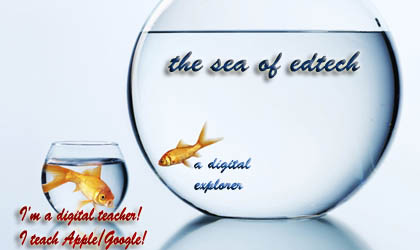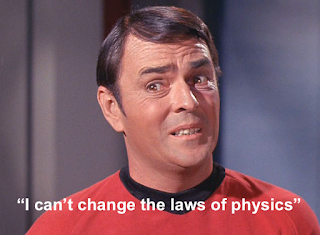I’ve been ruminating over the latest ECOO conference for a couple of days now. Strangely, this technology conference began and ended for me with others suggesting that digital technology is a dangerous waste of time and that we should step away from it in our classrooms. Looking at my ECOO reflections over the past eight years I’m seeing a clear shift from optimism that we will get a handle on the digital revolution to caution and now a determined luddite push to walk away from it entirely. The now obviously deleterious effects of the attention economy seem to have produced an unprecedented negativity around educational digital technology in 2018, and ECOO book-ended it for me.
 |
| These aren’t toys, they’re tools! Calling them toys says a lot about how YOU use them. |
I opened the conference bringing armfuls of emerging technology to Minds on Media. I’ve long tried to avoid the ‘here’s-a-turnkey-tech-tool’ presentation because it usually comes with corporate compromises. That split focus in a lot of ‘edtech’ means much of it isn’t really so much about learning as it is about data collection or closed ecosystems that drive profitability. Besides, I’ve long advocated for teachers who push technology to actually understand the technology they are requiring students to use. That kind of technical fluency means you don’t get sucked into absurd situations like giving away student data for a ‘free’ service or driving students into expensive, proprietary, closed technology designed to make a profit when it inevitably breaks.
As in previous ECOO MoM demonstrations, I brought a variety of tech from different manufacturers and simply encouraged educators to become aware of an emerging new medium, in this case virtual reality. I have no agenda and nothing to sell. I get nothing for showing the technology and don’t benefit from anyone buying one thing or another. This platform agnosticism means I can talk about the tech without prejudice or hidden agenda. I was happy to be attending another MoM day and looking forward to showing people this emerging medium.
At least I was until Peter went around the room having the stations introduce themselves. It all went well until we got stuck on one station that repeatedly described what everyone else was doing in the room as ‘playing with toys’ while describing their own noble pursuit as being ‘real’ and technology free (though without ICT infrastructure they couldn’t have done what they were doing at all). This attitude isn’t new. A surprising number of educators refuse to leverage digital tools to make their teaching more effective, but to hear someone shit can what everyone else is doing at this edtech conference was shocking. There was no opportunity to call her out on it then, but I can now:
 |
| Too bad we don’t teach it like it matters. Critical Infrastructure. Jobs in ICT. |
This Minds on Media presenter monopolized the microphone to suggest anything digital was essentially meaningless (a toy) and that when people were ready to stop playing with their toys here she was ready to show them something real. As a technician who trains engineers and technicians to run the world we live in, this made me angry, especially considering it was done at an educational technology conference that should be advocating for technical fluency across our education system in order to understand and effectively participate in the world we live in. This didn’t put me in a great frame of mind to start the conference, but I soldiered on.
| Cybersecurity in our classrooms. |
I did two other presentations during the conference. Both were presenting on platform agnostic technology opportunities that would teach students and teachers about a critical infrastructure (cybersecurity) and addressing our collective ignorance of 3d media. In both cases I was advocating for not-for-profit digitally powerful learning opportunities that would enable Ontario educators and students to leverage the digital TOOLS at their disposal. This is the opposite of the reductive and now recessive thinking I kept experiencing.
| 3d media in marketing & learning |
There is now a two pronged attack on digital technology in the classroom. The corrosive ra-ra edtech crowd seems increasingly determined to brand themselves behind proprietary corporate systems designed to deliver technology with no understanding required (and with lots of hidden profit centres), while the increasingly loud anti-tech crowd rises up against them, advocating that we receded from technology because it’s a distraction and a waste of time. Both sides seem determined to ignore a simple fact: we’re supposed to be TEACHING students how this all works, not branding them or hiding them in a cave. What edtech there is seems determined to follow consumerism into the most simplistic and ignorant relationship with digital tools possible. In 2018 you can get branded or abstain from tech entirely and then feel mighty righteous about it. Is anyone left just, ya know, teaching it any more?
 There are technicians and engineers all around the world who provide digital infrastructure that we all depend on. These people understand this technology and are much less likely to act like the sheeple who stare slack-jawed at their phones for hours on end. To digitally literate people this technology is a powerful tool that is enabling us to do everything from gene editing diseases and linking disparate areas of study to creating more efficient critical utility systems. Digital technology has become a vital part of the infrastructure around us, yet the vast majority of us, including many teachers, are completely ignorant of it.
There are technicians and engineers all around the world who provide digital infrastructure that we all depend on. These people understand this technology and are much less likely to act like the sheeple who stare slack-jawed at their phones for hours on end. To digitally literate people this technology is a powerful tool that is enabling us to do everything from gene editing diseases and linking disparate areas of study to creating more efficient critical utility systems. Digital technology has become a vital part of the infrastructure around us, yet the vast majority of us, including many teachers, are completely ignorant of it.
For some baffling reason we seem intent on ignoring the actual teaching and understanding of these powerful digital technologies in favour of using them with the same perverse ignorance, and now fear, as the general public. What is our role as educators in terms of technology if we aren’t producing technically competent graduates who can successfully navigate and participate in the digital world around them? By the way, our ignorance of digital technologies is staggeringly bad. If you haven’t followed any of the supporting links in this so far, follow that one.
The closing keynote ended the conference by banging the same drum as that ‘when you’re done playing with these toys come and do something real’ comment that kicked it off. This time one of the engineers of the attention economy that is causing so much damage earnestly suggested that we need to recede from digital activity in order to preserve not just learning but our very humanity! Rather than acknowledge the potential for digital technology to enhance learning, his entire talk was aimed at retreating from it.
This particular group of Silicon Valley architects now wants to save the consumers they got wealthy commodifying. I get the impulse. If I had a bank account full of blood money like that I’d feel bad about it too, but as a means of resolving this technological adolescence we’re all living in, it won’t work – they can’t see past the mess they’ve made and they certainly aren’t approaching it from an educator’s mindset – but then neither are the educators.
There was not a single example of how digital technology might amplify or improve learning outcomes – a decidedly odd way to wrap up an edtech conference. Our speaker went on to encourage the removal of personal technology from the hands of students and get back to a pre-digital time when everything was better. As a digital immigrant I know that there was no such time. If you think students weren’t distracted in class in the 1980s you weren’t a student in the 1980s. These Silicon Valley wolves can’t see people as anything other than the consumer sheep they used to prey on. I’d hope that teachers see much more potential in their students than these attention peddlars do, but I’m starting to think that vapid consumerism is the only relationship we’ll ever have with digital technology.
| Invent a crisis and then offer a solution to it. American business in action. |
From an educational perspective digital technology offers a powerful tool for learning, but it doesn’t work if the teachers, administrators and government driving it are ignorant of how it works. If the teachers and parents can’t manage the tech, then we can hardly expect students to. I’d hope that ECOO and other curriculum support organizations would understand that and advocate for understanding and the development of broader technical fluency rather than encouraging willful ignorance.
Hiding digital tools and telling people to ignore the way the world works is a poor way to run an educational system, unless your goal is to produce ignorant consumers. Instead of running away from the digital revolution that is driving innovation and increasingly managing the infrastructure around us, we should be teaching self regulation of personal technology and comprehension of how it all works in order to generate a genuine understanding the world we’re creating. Teaching effective digital fluency means we’re less likely to be taken by the consumerist wolves and are able to effectively use digital tools rather than being used by them.
I’m all for being challenged in my thinking and often go out of my way to try on difficult ideas just to see how they fit. I’ve weathered Nick Carr’s The Shallows and watched society wobbling under the weight of the robber barons of the attention economy. Now I’ve attended an educational technology conference that began and ended with an ignorant and frankly dangerous dismissal of digital technology as a toy for idiots that should just be taken away. Meanwhile digital infrastructure made that very event happen. It fed the people who attended it and provided them with the resources they needed to travel to it, yet it isn’t worthy of teaching in our schools? And teaching it is precisely the problem. We pick up edtech and apply it without teaching it to staff or students, and now we’re shocked that it isn’t working well? Sometimes I wonder how educationally aware our education system is.
I’ve been banging my head against this call for technology fluency for so long that I can’t help but feel like this dismissal of technology both by participants and the conference itself in that closing keynote is a betrayal of what I thought were shared values.
I first attended ECOO in 2010. I joined Twitter, began meeting other technology interested teachers, started blogging and became part of a vibrant online PLN as a result of attending. Over the years ECOO has given me ideas and offered me a platform to present my own. What I’d always hoped was an evolution towards greater understanding of the digital revolution we are all living through has faltered now. We don’t want to learn how the world we’ve built works. Pro-edtech educators want to keep the curtain firmly in place and leave the understanding and management of technology to others while the increasingly noisy anti-tech crowd are advocating receding from it entirely. Our only contact with digital technology is through the lens of vapid consumerism and the only response we can have to that other than participating is to run and hide.
I’m frustrated, tired and losing hope in our ability to manage an understanding of the digital revolution that surrounds us. Education seems particularly incapable of seeing their way out of this digital hole we’ve dug for ourselves. The answer has always been to teach technological fluency, but ironically, I’m finding it harder and harder to find anyone who wants to.
from Blogger https://ift.tt/2z6mt6T
via IFTTT













